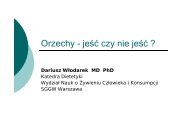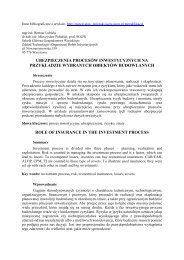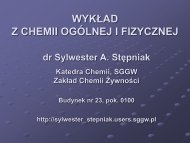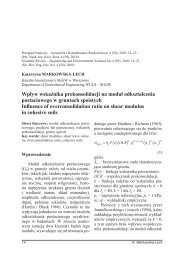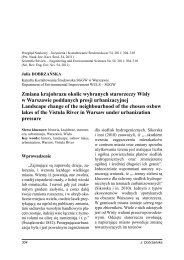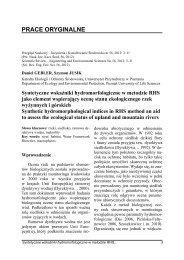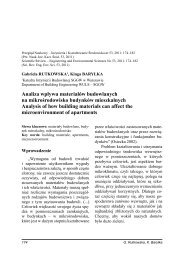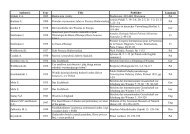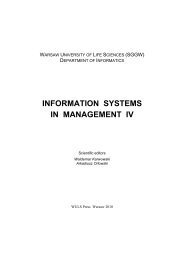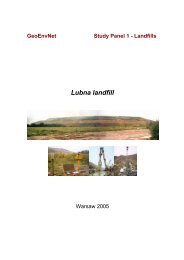ACTA SCIENTIARUM POLONORUM - SGGW
ACTA SCIENTIARUM POLONORUM - SGGW
ACTA SCIENTIARUM POLONORUM - SGGW
Create successful ePaper yourself
Turn your PDF publications into a flip-book with our unique Google optimized e-Paper software.
Differences in possible reactions of eu farmers from selected european regions... 55farmers’ reactions to changes of the Common Agricultural Policy. These differences inreactions may result from different local conditions and historical experiences of farmersfrom the “new” and “old” members of the EU, as well as from current financial situationand different farmers’ expectations regarding the future. It indicates the crucial challengefor the CAP which is to maintain a Common policy framework while fitting to a varietyof regional conditions and expectations of policy beneficiaries.However, the limited statistical significance between number of farmers declaring,“an increase” for specified structural parameters questions in Baseline and No CAP Scenarioin many regions suggests that the design of the CAP, or even the CAP as a whole, isnot the only and exclusive factor determining future farmers decisions. An important issuefor further research is then to analyze farmers’ answers in connection to their regionalcontext, in order to elicit further factors that can affect future changes in farming sector.The results also lead to the conclusion that the strongest connections between CAPScenarios and the kind of answers were usually noted among farmers from Podlaskie(Poland) and from South-East Planning Region (Bulgaria). It suggests that farmers fromthese regions usually assume farms development (increase) only in case of receiving supportfrom CAP or, in general, are more dependent on the policy than it is the case in otherregions. This may strengthen the existing policy concern about a re-alignment of the CAPdesign between Old and New Member States, though it does not provide a clear answerabout the most suitable direction to be taken in such re-alignment process.REFERENCESDeliverable n. D2.13–23, Survey Description, Project: Assessing the multiple Impacts of the CommonAgricultural Policies (CAP) on Rural Economies, 2010.EC 2008a. Commision Staff Working Document SEC (2008)1885; Brussels, 20.05.2008.EC 2008b. IP/08/1749: Agriculture: CAP Health Check will help farmers meet new challenges,Brussels, 20.11.2008SCENAR 2020. Scenario study on agriculture and the rural Word. European Communities, 2007Wieck Ch. Dominiguez I.P., Britz W., 2003. New Chalenges for the European Agriculture: ModellingAgricultural Reform Under the New WTO Proposals; mat. konferencyjne Capri 23–26czerwca 2003. EC 2010: Communication From the Commission to the Council, TheEuropean Parliament, the European Economic And Social Committee and the Committeeof the Regions. The CAP towards 2020: meeting the food, natural resource and territorialchallenges of the future.Cristoiu A., Sammeth F., Gomez Paloma S.: Prospective Scenarios Deliverable no. 8.1; CAP-IREProject.Czyżewski A., Stępień S., 2009. Reforma mechanizmu WPR w ramach “Health Check” a potrzebastabilizacji rynków rolnych UE. [w:] Common Agricultural Policy of The EU – Conditionings,Mechanisms, Efects.IDEMA 2007. The Impact of Decoupling and Modulation in the European Union: a sectoral and farmlevel assessment, Final Report, 2007.Lobely M., Butler A., 2010. The impact of CAP reform on farmers’ plans for the future: Some evidencefrom South West England, Food Policy, volume 35.Majewski E. i in., 2009. Wspólna Polityka Rolna UE i próby modelowego ujęcia wpływu jej zmian nasytuację w rolnictwie. [w:] Wpływ zmian we wspólnej polityce rolnej na wyniki ekonomicznegospodarstw towarowych w Polsce w perspektywie 2014 roku. Wyd. <strong>SGGW</strong>, Warszawa.Oeconomia 10 (1) 2011



